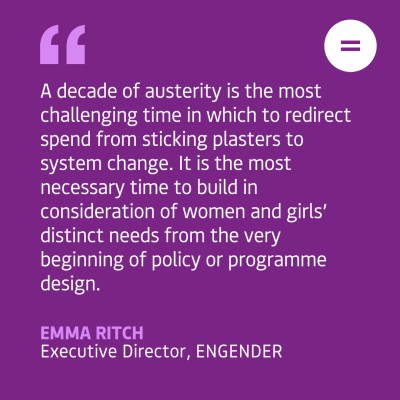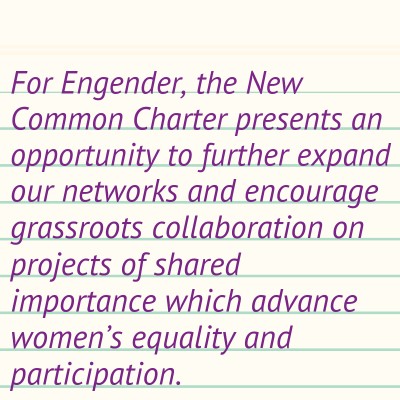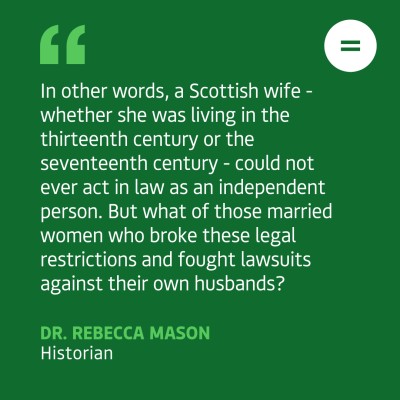Engender blog
GUEST POST: Divorce and Women’s Rights in Scottish History
Dr Rebecca Mason is a historian whose work focuses on Scottish legal and social history, and women’s legal rights. She is currently writing a book on ordinary women’s navigation of legal systems and property relationships in early modern Scotland. In this blog, Dr Mason explores the complex history of divorce law in Scotland in the context of married women’s rights.
For centuries, nothing determined a Scottish woman’s identity more than her marital status. For a woman living in Scotland during the sixteenth century, her legal rights were inextricably connected to her relationship to a man: as a daughter to a father, a wife to a husband, or a widow to a former husband. Whether a woman was single, married, or widowed greatly defined her legal, social and economic opportunities during a time when men’s laws ruled women’s lives.
Prior to key legislative changes in the nineteenth century, Scottish legal rules concerning married women’s rights restricted a wife’s ability to own property, control real estate, enter into agreements, or initiate litigation without her husband’s consent. In other words, a Scottish wife - whether she was living in the thirteenth century or the seventeenth century - could not ever act in law as an independent person. But what of those married women who broke these legal restrictions and fought lawsuits against their own husbands?
While the legalities of marriage and divorce continue to evolve today, it is fascinating to uncover how women in heterosexual relationships managed the breakdown of their marriages in Scotland hundreds of years ago, including how separating and divorcing women sought to protect their rights during a time when they were afforded few.
Incorporating CEDAW - what a new human rights bill could do for women in Scotland
Last week marked the start of Incorporation Fortnight – a two week campaign led by the Human Rights Consortium Scotland focused on human rights incorporation and a new human rights law for Scotland. In this blog, our Policy and Parliamentary Manager Eilidh Dickson explores incorporation of CEDAW and what it could mean for women in Scotland.
-400.png)
Just before the May 2021 election, the then Scottish Government announced its intention to bring in a new human rights bill in the next parliament that would serve as a new human rights framework for Scotland.
Following years of work by the Taskforce on Human Rights and the Advisory Group on Human Rights, the Scottish Government accepted the recommendation that such a Bill should incorporate a range of international human rights treaties, including the United Nations Convention on the Elimination of All Forms of Discrimination Against Women (CEDAW). Most parties shared this commitment at the election and work on the bill is imminent.
Engender has long called for incorporation of CEDAW into Scots Law (read our report here) and we're excited to get to work on the bill process because of the opportunities we see for progressing substantive equality between women and men in Scotland. In this blog, we set out further what incorporation is and could mean for women in Scotland.
Marking 10 years since the Christie Commission
A decade ago saw the report from the Christie Committee, a ground-breaking inquiry which aimed to usher in a new era in public sector delivery in Scotland. To mark 10 years since the release of the report, our Executive Director Emma Ritch joined sector leaders in a special edition of Third Force News magazine to reflect on the Commission and progress made on its recommendations.

Christie finished its work just after the public sector equality duty came into being, and its critical focus on prevention really aligns with the duty.
So much of the inequality that women experience comes from laws, policy, programmes, and institutions that have missed the opportunity to get it right for women in the first place. Everything from transport systems to parks to health services are designed around the preferences and needs of boys and men. The consequences are dire: women in Scotland have less say in their communities, less power, less safety, and fewer resources.
The Christie report didn’t mention women at all but it did recommend that equality be integrated into the National Performance Framework. It also called for the public sector equality duty to be tooled to establish partnership working on reducing discrimination and advancing equality, and for public bodies to gather sufficient equality data to inform service design. We see relatively little evidence that any of this has been realised. Only two of the 81 NPF indicators relate directly to women and girls. The public sector equality duty has been a damp squib in terms of making change happen.
F-words: Finn McKay on gender ideology
Dr Finn Mackay is a sociology lecturer at the University of the West of England in Bristol and author of ‘Radical Feminism: Feminist Activism in Movement’. Here, ahead of the release of her new book 'Female masculinities & the gender wars’, Dr Mackay explores the term ‘gender ideology’ and what it means for feminism in the UK.
-400.png)
What is gender ideology?
The term “gender ideology” is not new (Graff & Korolczuk, 2018).This language began to be used by the Catholic church in the mid 1990s, for example in Beijing at the fourth World Conference for Women. Pope John Paul II wrote to the UN Secretary General, emphasising the natural complementarity of men and women, masculinity and femininity, and restating that the sexes are equal, but different. Catholic education guides warn against gender ideology, which they see as indoctrinating children into viewing sexuality, gender and sexed identities as fluid or influenced by personal choice. In the US, right-wing, Christian evangelical groups like the Family Research Council, label gender ideology as the third wave of attack against the heterosexual nuclear family; the first wave being the women’s liberation movement and the second being the gay liberation movement (O’Leary & Sprigg, 2015). The term is an evocative enemy, and platforms set up to oppose it can stand for traditional family values, separate sphere gender roles and nationalism. Activism against “gender ideology” has become a shorthand, and successfully unites many who are against abortion, women’s rights, equal marriage, LGBTQI+ rights, divorce rights or immigration for example.
Towards a New Common Chapter

Since spring this year, Engender has been involved in the 'Towards a New Common Chapter' project coordinated by the Centre for Cross Border Studies. Here, our policy and parliamentary manager Eilidh Dickson looks at our international work and our work on the project so far.
Engender’s work across the UK, Europe and internationally is a vitally important aspect of the feminist policy and advocacy work that we do.
Progressing women’s rights and equality in Scotland often depends on the learning and experience we can gather from our sisters across the women’s sector, both nationally and through international networks such as the UK Joint Committee on Women and the European Women’s Lobby (EWL), the largest umbrella body of feminist organisations in Europe. So often, challenging the root causes of gender inequality demands the same or similar actions wherever we are, and being able to rely on and show solidarity as women’s organisations is crucial in amplifying our work.
Downloads
 Engender Briefing: Pension Credit Entitlement Changes
From 15 May 2019, new changes will be introduced which will require couples where one partner has reached state pension age and one has not (‘mixed age couples’) to claim universal credit (UC) instead of Pension Credit.
Engender Briefing: Pension Credit Entitlement Changes
From 15 May 2019, new changes will be introduced which will require couples where one partner has reached state pension age and one has not (‘mixed age couples’) to claim universal credit (UC) instead of Pension Credit.
 Engender Parliamentary Briefing: Condemnation of Misogyny, Racism, Harassment and Sexism
Engender welcomes this Scottish Parliament Debate on Condemnation of Misogyny, Racism, Harassment and Sexism and the opportunity to raise awareness of the ways in which women in Scotland’s inequality contributes to gender-based violence.
Engender Parliamentary Briefing: Condemnation of Misogyny, Racism, Harassment and Sexism
Engender welcomes this Scottish Parliament Debate on Condemnation of Misogyny, Racism, Harassment and Sexism and the opportunity to raise awareness of the ways in which women in Scotland’s inequality contributes to gender-based violence.
 Gender Matters in Social Security: Individual Payments of Universal Credit
A paper calling on the Scottish Government to automatically split payments of Universal Credit between couples, once this power is devolved to the Scottish Parliament.
Gender Matters in Social Security: Individual Payments of Universal Credit
A paper calling on the Scottish Government to automatically split payments of Universal Credit between couples, once this power is devolved to the Scottish Parliament.
 Gender Matters Manifesto: Twenty for 2016
This manifesto sets out measures that, with political will, can be taken over the next parliamentary term in pursuit of these goals.
Gender Matters Manifesto: Twenty for 2016
This manifesto sets out measures that, with political will, can be taken over the next parliamentary term in pursuit of these goals.
 Scottish NGO Briefing for UN Special Rapporteur on Violence Against Women
Joint briefing paper for the UN Rapporteur on Violence Against Women.
Scottish NGO Briefing for UN Special Rapporteur on Violence Against Women
Joint briefing paper for the UN Rapporteur on Violence Against Women.

Newsletter
Sign up to receive our newsletter here:
Sign up to our mailing list
Receive key feminist updates direct to your inbox:
